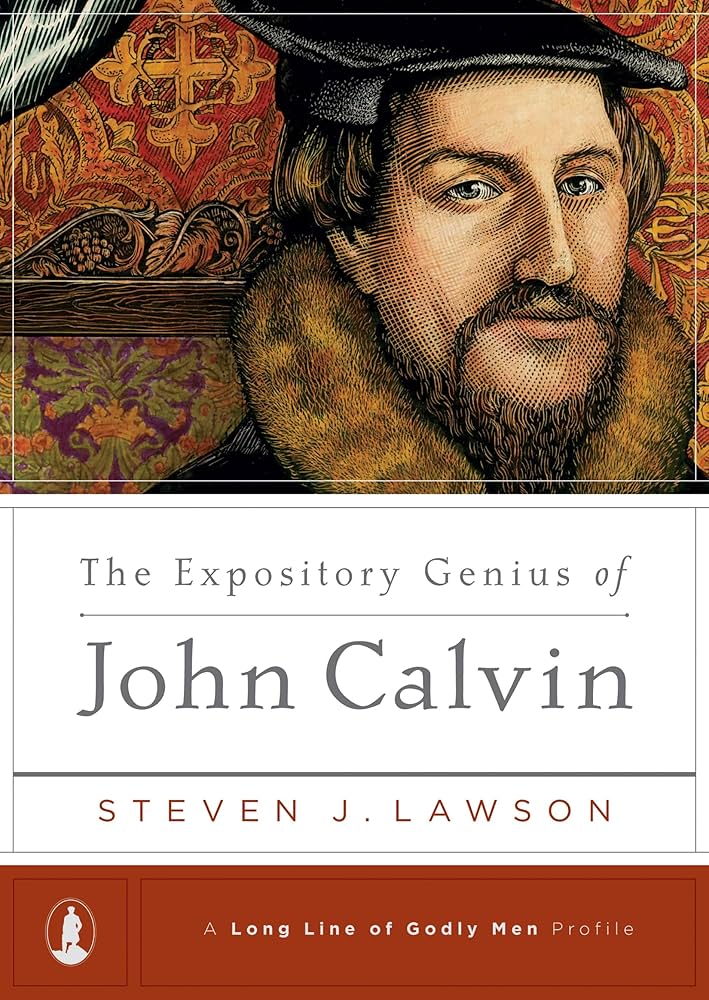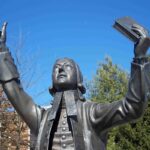The Expository Genius of John Calvin by Steven Lawson
Ligonier Ministries, 2007. 142 pages.
Protestant reformer John Calvin was a theologian, expositor, and exegete who saw pulpit ministry as the cornerstone of a God-given calling upon his life. Author Steven Lawson’s biography examines the preparation Calvin underwent as he sought to bring to the light every portion of the scriptures which he expounded.
The Expository Genius of John Calvin is also about the glory of God seen in Calvin’s preaching and teaching. The struggles he underwent in order to illuminate the meaning of the scriptures are not deeply investigated here, but readers get a glimpse of the overwhelming odds that Calvin had to overcome every time he stepped into the pulpit.
The first in the series, “A Long Line of Godly Men” published by Reformed discipleship organization Ligonier Ministries, each book in the helpful series is concise and engaging.
“Wherever he could, Calvin ran to the defense of the gospel,” Lawson writes. “He was not ashamed of the gospel of God in Jesus Christ.”
Calvin preached sermons with vigor and truth critiquing then-commonplace practices within Roman Catholicism.
“The Roman Catholic Church today continues the same kind of idolatrous practices that were common amongst the heathen, but in the name of the apostles and of the virgin Mary,” Calvin declared. “The only things that have changed are the names of the idols! But superstition is as wicked and detestable today as it was amongst the first idolaters!”
Unwavering belief in Biblical authority profoundly shaped Calvin’s preaching.
“We owe to the Scripture the same reverence which we owe to God because it proceeded from Him alone, and has nothing of man mixed with it,” Calvin stated. It was this foundational conviction that propelled and shaped Calvin’s ministry. When Calvin went to the pulpit, it was to preach the actual words of God.
Lawson outlines 32 distinctives in Calvin’s preaching, examining Calvin’s preparation for the pulpit to the sermons themselves. The author looks at how Calvin introduced his messages, with what care Calvin took to ensure his message was truly and consistently from the texts of Scripture, how he applied the truth to his hearers, and how he concluded his messages.
At the conclusion of each chapter, Lawson offers a short prayer to God to raise up men who will be characterized by distinctives laid out in the chapter. For the author this wasn’t merely a walk through church history but rather a longing for men of this generation to be found boldly, accurately, and passionately preaching God’s Word.
The book examines areas of Calvin’s life and ministry: approaching the pulpit, preparing the preacher, launching the sermon, expounding the text, crafting the delivery, applying the truth, and concluding the exposition.
Lawson communicates Calvin’s love for both the Lord and for God’s Word. Calvin’s personal seal was an emblem of a pair of human hands holding out a heart to God with an inscription translated, “My heart I give to thee, O Lord, promptly and sincerely.”
“We owe to the Scripture the same reverence which we owe to God because it has proceeded from Him alone and has nothing of man mixed with it,” Calvin wrote (from John Calvin: Selections from His Writings).
While Calvin was brilliant intellectually and expositorily, he also spoke in a way that was accessible to the laity.
“His words were simple and understandable…and he mastered it,” Lawson notes.
The author implores the 21st century Christian to become like Calvin:
“We must do what Calvin, and the Reformers did so long ago. There are no new remedies for old problems. We must come back to old paths. We must capture the centrality and pungency of biblical preaching once again. There must be a decisive return to preaching that is Word-driven, God-exalting, Christ-centered, and Spirit-empowered. We desperately need a new generation of expositors, men cut from the same bolt of cloth as Calvin. Pastors marked by compassion, humility, and kindness must once again ‘preach the word.’ In short, we need Calvins again to stand in pulpits and boldly proclaim the Word of God.”
The Expository Genius of John Calvin aims “to raise the bar for a new generation of expositors.” It had that effect upon my life and I pray that it will also have on yours. The book concludes with these final words from Charles Spurgeon, known as “the prince of preachers”:
“We want again Luthers, Calvins, Bunyans, Whitefields, men fit to mark eras, whose names breathe terror in our foeman’s ears. We have dire need of such. Whence will they come to us? They are the gifts of Jesus Christ to the church and will come in due time. He has power to give us back again a golden age of preachers, and when the good old truth is once more preached by men whose lips are touched as with a live coal from off the altar, this shall be the instrument in the hand of the Spirit for bringing about a great and thorough revival of religion in the land … I do not look for any other means of converting men beyond the simple preaching of the gospel and the opening of men’s ears to hear it. The moment the church of God shall despise the pulpit, God will despise her. It has been through the ministry that the Lord has always been pleased to revive and bless His churches.”






Comment by ROGER on August 20, 2024 at 4:06 pm
WHICH GOSPEL DID CALVIN PREACH? MATT. 9: 35 OR 1 CORINTHIANS 15: 1 – 4. SALVATION TODAY COMES BY BELIEVING 1 CORINTHIANS 15: 1 – 4. GALATIANS 1: 8 – 9 , TELLS US WHY, IF WE PREACH ANOTHER GOSPEL WE ARE ACCURSED. THE RESURRECTION MUST BE PART OF OUR SALVATION BELIEF.
Comment by David Gingrich on August 27, 2024 at 7:18 am
Satan uses arrogant theology.
Comment by Thomas on September 3, 2024 at 11:08 pm
“The Roman Catholic Church today continues the same kind of idolatrous practices that were common amongst the heathen, but in the name of the apostles and of the virgin Mary,” Calvin declared. “The only things that have changed are the names of the idols! But superstition is as wicked and detestable today as it was amongst the first idolaters!” Which is untrue! Veneration of the saints and Mary comes from the first centuries of Christianity, and images aren`t idols. Luther had a deep veneration for Mary, not very different from the Catholics. Calvin seems to have developed a certain hatred of Catholicism, which didn`t allowed him to see things more clearly.